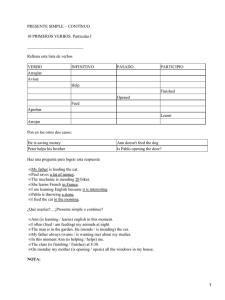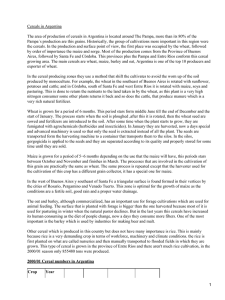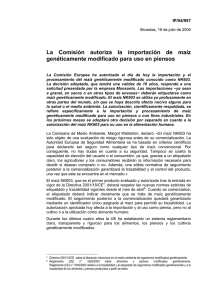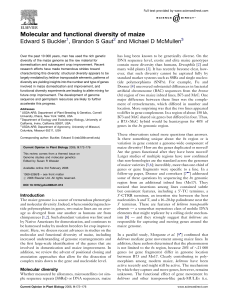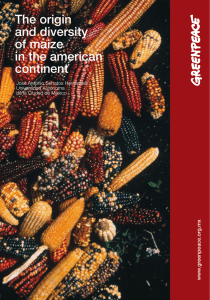Innovación tecnológica en la producción de semillas
Anuncio
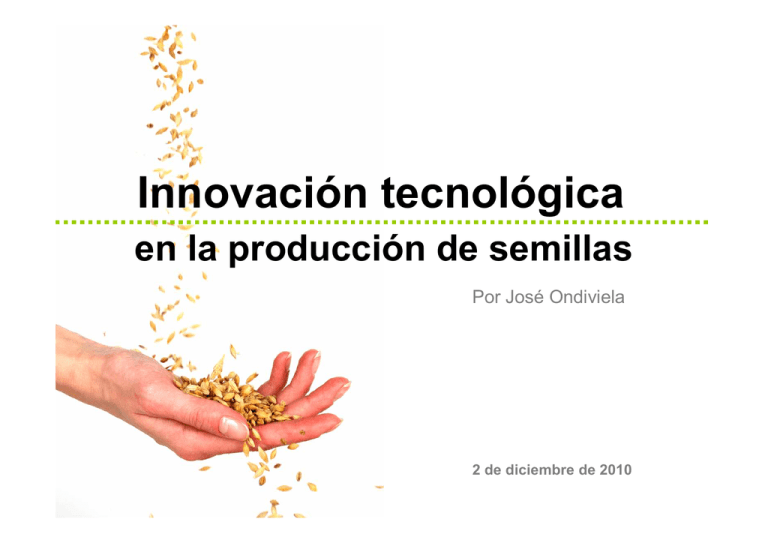
Innovación tecnológica en la producción de semillas Por José Ondiviela 2 de diciembre de 2010 Semilla y variedad Soporte físico de la información genética Propiedad intelectual Mejora tradicional Evolución biológica y domesticación de las especies Mejora tradicional • Material de partida • Método de selección • Limitaciones de la mejora Nuevas tecnologías Fundamentos de las nuevas tecnologías • Biología molecular • Ingeniería genética Nuevas tecnologías Cultivo de tejidos • Cultivo de anteras • Micropropagación • Rescate de embriones • Semillas artificiales Nuevas tecnologías Selección asistida por marcadores moleculares Ingeniería genética Cultivos OGM Silenciamiento de genes Kits de diagnostico Situación actual OGM en el mundo OGM en la Unión Europea OGM en España Situación actual – OGM en el mundo Situación actual – OGM en el mundo Situación actual – OGM en el mundo Principales cifras de interés • 134 millones de hectáreas, 54% p. desarrollados • 25 países en los que viven 3.600 millones personas • 14 millones de agricultores • Canadá 93% de colza • India 87% de algodón • Tolerancia a herbicidas 62% del total • Genes apilados 21% en 11 países Situación actual – OGM en el mundo Principales cifras en el mundo Cultivo Total millones Has. % OGM Soja 90 75 Algodón 33 50 Maíz 158 25 Colza 31 20 Situación actual – OGM en la UE Algodón I Producto Empresa Cotton (MON1445) Monsanto cp4 epsps gene inserted to confer tolerance to the herbicide glyphosate · Food produced from MON 1445 cotton (cottonseed oil) · Food additives produced from MON1445 cotton · Feed produced from MON1445 cotton (feed materials and feed additives) Cotton (MON15985) Monsanto cry1Ac and cry2Ab2 genes inserted to confer insectresistance highly selective in controlling Lepidopteran insects · Food additives produced from MON-15985-7 cotton Características Uso autorizado · Feed produced from MON 15985 cotton (feed materials and feed additives) Situación actual – OGM en la UE Algodón II Producto Empresa Características Uso autorizado Cotton (MON15985 x MON1445) Monsanto cry1Ac and cry2Ab2 genes inserted to confer insectresistance highly selective in controlling Lepidopteran insects · Food additives produced from MON15985 x MON1445 cotton · Feed produced from MON15985 x MON1445 cotton (feed materials and feed additives) Cotton (MON531) Monsanto cry1A(c) gene inserted to confer insect-resistance · Food produced from MON 531 cotton (cottonseed oil) · Food produced from MON 531 cotton (food additives) · Feed produced from MON 531 cotton (feed materials and feed additives) Situación actual – OGM en la UE Algodón III Producto Empresa Características Uso autorizado Cotton (MON531 x MON1445) Monsanto cry1A(c) gene inserted to confer insect-resistance cp4 epsps gene inserted to confer tolerance to the herbicide glyphosate · Food additives produced from MON15985 x MON1445 cotton · Feed produced from MON15985 x MON1445 cotton (feed materials and feed additives) Cotton (LLCotton25) Bayer pat gene inserted to confer tolerance to the glyphosinate-ammonium herbicide · Foods and food ingredients containing, consisting of, or produced from ACS-GHØØ1-3 cotton. · Feed containing, consisting of, or produced from ACS-ACS-GHØØ1-3 cotton. · Products other than food and feed containing or consisting of ACSGHØØ1-3 cotton for the same uses as any other cotton with the exception of cultivation. Situación actual – OGM en la UE Maíz I Producto Empresa Maize (BT11) Syngenta · The cryIA (b) gene inserted to confer insect-resistance. · The pat gene inserted to confer tolerance to the herbicide glufosinateammonium · Foods and food ingredients containing, consisting of, or produced from SYN-BTØ11-1xMON-ØØØ21-9 · Feed containing, consisting of, or produced from SYN-BTØ11-1xMONØØØ21-9 Products other than food and feed containing or consisting of SYNBTØ11-1xMON-ØØØ21-9 Maize (DAS59122) Pioneer · The cry34Ab1 and cry35Ab1 genes inserted to confer protection against certain coleopteran pests. · Pat gene inserted to confer tolerance to the glufosinateammonium herbicide. · Food produced from MON 531 cotton (cottonseed oil) · Food produced from MON 531 cotton (food additives) · Feed produced from MON 531 cotton (feed materials and feed additives) Características Uso autorizado Situación actual – OGM en la UE Maíz II Producto Empresa Maize (DAS1507x NK603) Pioneer Maize (DAS01507) Pioneer Características Uso autorizado · Cry1F gene inserted to confer protection against certain lepidopteran pests. · Pat gene inserted to confer tolerance to the glufosinateammonium herbicide. · Cp 4epsps gene inserted to confer tolerance to the glyphosate herbicide · Foods and food ingredients containing, consisting of, or produced from DAS-Ø15Ø7-1xMON-ØØ6Ø3-6 maize. · Feed containing, consisting of, or produced from DAS-Ø15Ø7-1xMONØØ6Ø3-6 maize. · Products, other than food and feed, containing or consisting of DASØ15Ø7-1xMON-ØØ6Ø3-6 maize. · Cry1F gene inserted to confer resistance to the European corn borer and certain other lepidopteran pests. · Pat gene inserted to confer tolerance to the glufosinateammonium. · Foods and food ingredients containing, consisting or produced from DAS1507 maize. · Feed containing or consisting of DAS1507 maize. · Feed produced from DAS1507 maize (feed materials and feed additives) · Other products containing or consisting of DAS1507 with the exception of cultivation Situación actual – OGM en la UE Maíz III Producto Empresa Maize (GA21) Syngenta Maize (MON810) Monsanto Características Uso autorizado · Mepsps gene inserted to confer tolerance to herbicide glyphosate · Foods and food ingredients containing, consisting of, or produced from MON-ØØØ21-9 maize. · Feed containing, consisting of, or produced from MON-ØØØ21-9 maize. · Products other than food and feed containing or consisting of MONØØØ21-9 maize for the same uses as any other maize with the exception of cultivation · cryIA (b) gene inserted to confer resistance to lepidopteran pests · Foods and food ingredients produced from MON810 (including food additives). · Feed containing or consisting of MON810 maize. · Feed produced from MON810 maize (feed materials feed additives) · Seeds for cultivation Situación actual – OGM en la UE Maíz IV Producto Empresa Maize (MON863) Monsanto Maize (NK603) Monsanto Características Uso autorizado · A trait gene cry3Bb1 inserted to confer insect- resistance · NptII gene inserted as a selection marker · Food containing, consisting of, or produced from MON 863 maize. · Food additives produced from MON 863 maize. · Feed containing or consisting of MON 863 maize. · Feed produced from MON 863 maize (feed materials and feed additives). · Other products containing or consisting of MON863 with the exception of cultivation · cp4 epsps gene inserted to confer tolerance to the herbicide glyphosate · Food containing, consisting of, or produced from NK603 maize. · Food additives produced from NK603 maize. · Feed containing or consisting of NK603 maize. · Feed produced from NK603 maize · Other products containing or consisting of NK603 with the exception of cultivation Situación actual – OGM en la UE Maíz V Producto Empresa Maize (NK603 x MON810) Monsanto Maize (T25) Bayer Características Uso autorizado · cp4 epsps gene inserted to confer tolerance to glyphosate herbicides · the cry1Ab gene inserted to confer protection against certain lepidopteran insect pests (Ostrinia nubilalis, Sesamia spp. · Foods and food ingredients containing, consisting of, or produced from MON-ØØ6Ø3-6xMON-ØØ81Ø-6 maize. · Feed containing, consisting of, or produced from MON-ØØ6Ø3-6xMONØØ81Ø-6 maize. Products other than food and feed containing or consisting of MONØØ6Ø3-6xMON-ØØ81Ø-6 maize for the same uses as any other maize with the exception of cultivation · Pat gene inserted to confer tolerance to the herbicide glufosinate-ammonium · Food and food ingredients produced from T25 maize. · Feed containing, consisting of, or produced from T25 maize (feed materials and feed additives). · Seeds for cultivation. Situación actual – OGM en la UE Microorganismos Producto Empresa Características Bacterial biomass Ajinomoto Eurolysine Bacterial protein, by-product from the production by fermentation of L-Lysine HCl obtained from (Brevibacterium lactofermentum) the recovered killed microorganisms. The source is the Brevibacterium lactofermentum strain SO317/pCABL · Feed produced from GMO bacteria: " bacterial biomass" NOVO Yeast Cream is a product produced from genetically modified yeast strains (Saccharomyces cerevisiae) cultivated on substrates of vegetable origin. The source is the Saccharomyces cerevisiae strain MT663/pMT742 or pAK729 · Feed materials produced from GMO yeast: "yeast biomass" Yeast biomass NOVO Nordisk A/S Uso autorizado Situación actual – Bt en España Situación actual – Bt en España Empresa Variedades (actualizada a 2007) Pioneer Hi Bred PR33P67, PR32P76, BACILA, PR32R43, PR32W04, PR34N44, PR36R11, PR31N28, PR33B51, PR36B09, ELGINA, OLIMPICA, BOLSA, LEVINA, PR38F71, PR39V17, PR39F56 Monsanto agricultura DKC 6575, DKC 6550, DKC4442YG, DKC5784YG, DKC6041YG, DKC 5018YG, DKC6531YG, PLACIDO YG, DKC513, DKC3421YG, DKC6419YG, DKC6451YG, DKC6667 YG, DKC6844YG, TONIC YG Limagrain Ibérica ALIACAN BT, ARISTIS BT, GAMBIER BT, CAMPERO BT, HELEN BT, BELES SUR, LUSON BT, VIRIATO BT, ASTURIAL BT, ABREGO BT, THURRO YG, PONCHO YG Semillas Fitó Arlesa Koipesol JARAL BT, SF1035T, SF1036T, SF1112T, SF4701T, AZEMA YG, VENICI YG CUARTAL BT, RIGLOS BT PROTECT, KAPER YG KWS KXA5491 Coop. de Pau NOVELIS Agrar Semillas FOGGIA, MAS 60YG Corn States Int. EVOLIA YG, BENJI YG, KOFFI YG, ROCCO YG Futuro de las nuevas tecnologías Producir más con menos Alimentos cualitativamente mejores Productos energéticos Biofactorías Recuperación de suelos contaminados Bioética Aumento de la población mundial Seguridad alimentaria Alimentos seguros y saludables Respeto por el medio ambiente Protocolo de bioseguridad Retos Duplicar producción de alimentos Reducir la huella ecológica Mitigar el cambio climático Adaptación de los cultivos a la nueva situación Conclusiones Tecnología nueva con gran porvenir Muchos medios en todo el mundo Control oficial de alimentos sanos, saludables y respetuosos con el M. A. Desarrollo científico, tecnológico e industrial Responsabilidad basada en el conocimiento científico Muchas gracias por su atención José Ondiviela
